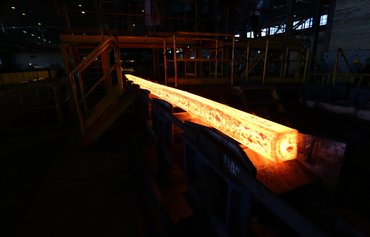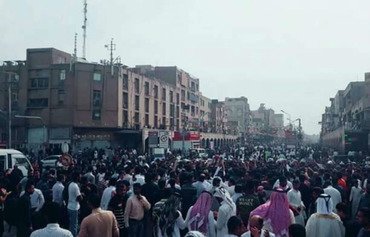Senior officers appointed to lead companies affiliated with the Islamic Revolutionary Guard Corps (IRGC) have been exploiting their positions to enrich themselves and evade taxes at the expense of the Iranian public, experts said.
As Iran grapples with a crippling economic crisis, they are lining their own pockets under the pretext that these companies generate funds for the IRGC's external operations and thereby help to "export the revolution".
This has contributed to Iran's domestic woes, which have brought the Iranian people to the streets to express their anger at the state of the economy.
The UN has voiced alarm at reports that dozens may have been killed in demonstrations in Iran, which have spread to more than 40 cities and towns.
![Iranian students are seen outside Tehran University. Youth in Iran face a close to 30% unemployment rate. [Photo via Mehr News]](/cnmi_am/images/2019/11/25/20758-Iran-youth-unemployment-600_384.jpg)
Iranian students are seen outside Tehran University. Youth in Iran face a close to 30% unemployment rate. [Photo via Mehr News]
Iranian people deprived of revenue
"It is well known that the IRGC controls most major companies in Iran through a network of senior officers who oversee this financial system," said Ain Shams University economics professor Shaher Abdullah.
The IRGC has developed this system into "a perpetual source of revenue for its coffers, not the coffers of the Iranian state and people", he told Al-Mashareq.
IRGC-affiliated companies, which control the industrial and business sectors, operate through hundreds of subsidiaries in order to evade taxes, he said.
"Tax evasion not only deprives the Iranian people of funds to which they are entitled, but also makes the volume of these operations a secret, to which only a few IRGC officers are privy," Abdullah said.
The already battered Iranian economy is deprived of capital and tax revenue from the profits of the operations of those subsidiaries, he said.
Many of these subsidiaries are multinational, which makes tracking them very difficult and also provides the IRGC with revenue from more than one country, Abdullah noted.
The IRGC's regional network has exhausted the resources of the Iranian people, Iranian affairs researcher Sheyar Turko told Al-Mashareq.
When the IRGC establishes an overseas affiliate, it recruits employees in that country through attractive financial packages, which are funded via Iran's public treasury, he said.
But the Iranian people see no return on this investment.
'Stifling economic crisis'
Unemployment in Iran is rising, said Tehran native Hossein Shayan, with close to two million Iranian workers losing their jobs in the latest wave.
"Every day, workers in Iran are being laid off by companies that are unable to survive because of the stifling economic crisis," he told Al-Mashareq.
Most Iranian provinces are witnessing demonstrations over unemployment, high prices and the inability to cope with the economic crisis, he said.
The Basij Resistance Force, an IRGC-affiliated paramilitary group which has been used to suppress domestic opposition, has stepped in to repress the demonstrations, Shayan said.
He blamed the current crisis on the squandering of the Iranian people's wealth abroad to enable the IRGC to pursue its regional ambitions.
"The Iranian people know full well that their wealth has been squandered because the IRGC controls the country's resources [and uses them] to implement its foreign plans," he said.
These have "brought nothing to Iran and the Iranians but poverty and unemployment", he added.
Meanwhile, it has come to light that senior IRGC officers are awash with money, he noted, and that they dispose of it without interference from the state.
Discussion of these issues used to be taboo, Shayan said, noting that the outbreak of demonstrations over high prices and unemployment has broken the barrier of fear that surrounded them.

![The IRGC-funded Fatemiyoun militia, which comprises Afghan fighters, is engaged in combat in Syria under the command of Iranian officers. [Photo courtesy of International Institute for Iranian Studies]](/cnmi_am/images/2019/11/25/20760-IRGC-militia-Afghan-600_384.jpg)






